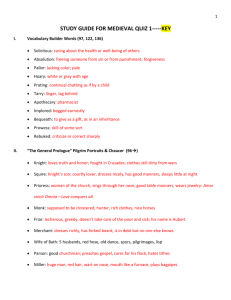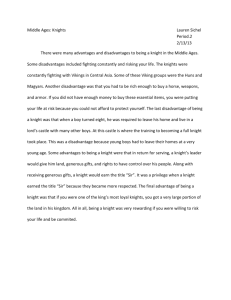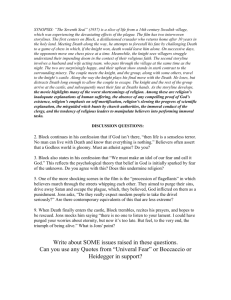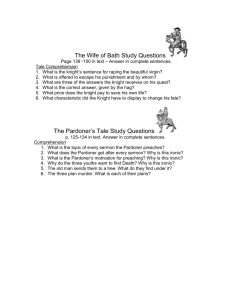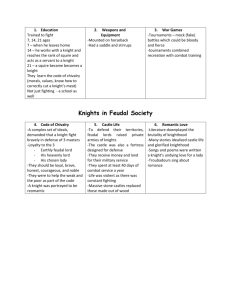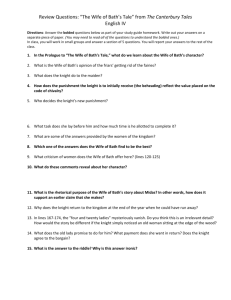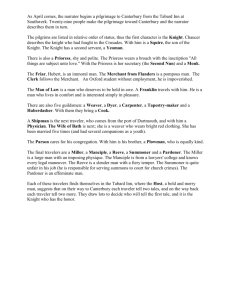Wife of Bath's Tale Analysis: Answer Key
advertisement
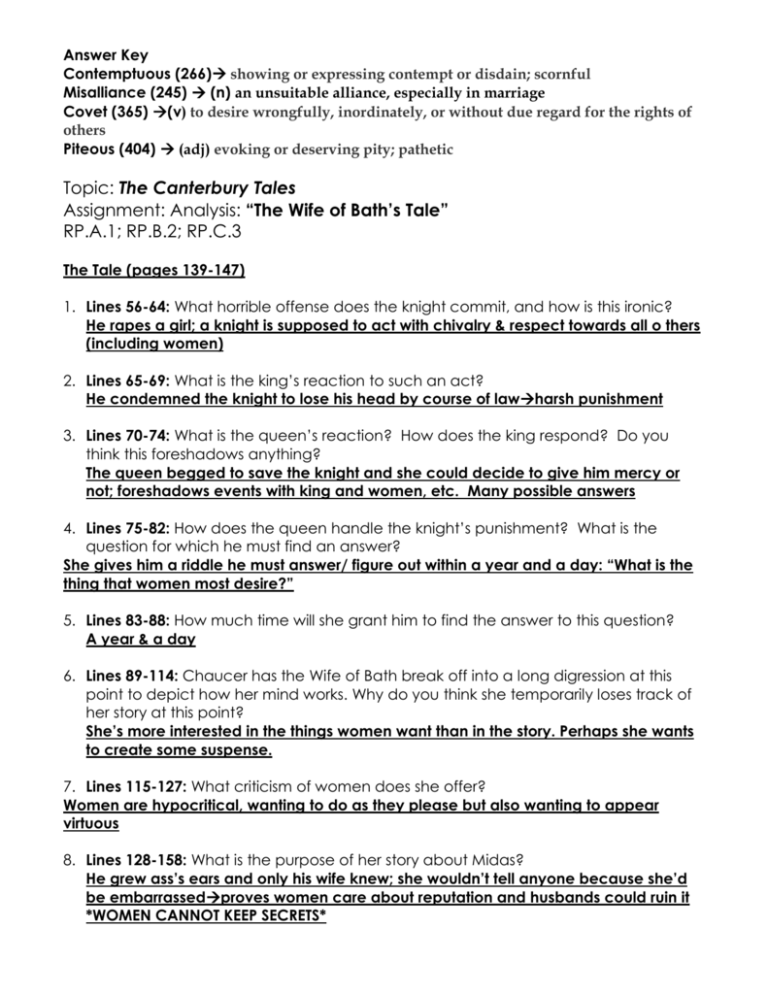
Answer Key Contemptuous (266) showing or expressing contempt or disdain; scornful Misalliance (245) (n) an unsuitable alliance, especially in marriage Covet (365) (v) to desire wrongfully, inordinately, or without due regard for the rights of others Piteous (404) (adj) evoking or deserving pity; pathetic Topic: The Canterbury Tales Assignment: Analysis: “The Wife of Bath’s Tale” RP.A.1; RP.B.2; RP.C.3 The Tale (pages 139-147) 1. Lines 56-64: What horrible offense does the knight commit, and how is this ironic? He rapes a girl; a knight is supposed to act with chivalry & respect towards all o thers (including women) 2. Lines 65-69: What is the king’s reaction to such an act? He condemned the knight to lose his head by course of lawharsh punishment 3. Lines 70-74: What is the queen’s reaction? How does the king respond? Do you think this foreshadows anything? The queen begged to save the knight and she could decide to give him mercy or not; foreshadows events with king and women, etc. Many possible answers 4. Lines 75-82: How does the queen handle the knight’s punishment? What is the question for which he must find an answer? She gives him a riddle he must answer/ figure out within a year and a day: “What is the thing that women most desire?” 5. Lines 83-88: How much time will she grant him to find the answer to this question? A year & a day 6. Lines 89-114: Chaucer has the Wife of Bath break off into a long digression at this point to depict how her mind works. Why do you think she temporarily loses track of her story at this point? She’s more interested in the things women want than in the story. Perhaps she wants to create some suspense. 7. Lines 115-127: What criticism of women does she offer? Women are hypocritical, wanting to do as they please but also wanting to appear virtuous 8. Lines 128-158: What is the purpose of her story about Midas? He grew ass’s ears and only his wife knew; she wouldn’t tell anyone because she’d be embarrassedproves women care about reputation and husbands could ruin it *WOMEN CANNOT KEEP SECRETS* 9. Lines 159-174: Who does the knight finally come across during his last day? 24 women dancing which vanished; one remained—old, ugly woman 10. Lines 175-198: What does the old woman ask of the knight in return for supplying him the answer he seeks? That he does whatever she requires of him 11. Lines 199-218: So, what is the answer to the “million-dollar” question? A woman wants power over her husband and lover (master of him; he cannot be above her) *EQUAL RIGHTS* 12. Lines 219-233: Now that his life has been spared, what does the old woman want from him? Wants him to marry her 13. Lines 234-248: What is the knight’s response to this request? He asks her to think of another request—tells her to take his goods, but not his body He refers to marrying her as “damnation” 14. Lines 249-258: What tortures the knight the most about the old woman? He wants his body and reputation 15. Lines 270-279: The old woman sees how unhappy the knight is and asks him to reveal why. She will refute each of his complaints. What are his reasons that he’s unhappy? She’s old, plain, poor, low-class 16. Lines 274-279: Is the knight’s reaction to the old woman an example of direct or indirect characterization? What does it reveal about his character? Indirecthe is egotistical & shallow. He places too much emphasis on rank & appearance 17. Lines 280-352: Explain how the old woman refutes the knight’s claim that she is not of “gentle birth.” Gentle birth is gentleness/kindness; it doesn’t come from social rank, but it comes from God. It’s kindness and virtuous—the way one treats another. It’s based on how one acts, not on who the parents are 18. Lines 353-382: How does the old woman respond to the knight’s claim that she is poor? God lived in poverty & we all follow him; There’s no shame in poverty if the heart is “right;” those who whine, fret, covet are poor; the poor has nothing to tempt a thief; Poverty strengthens one’s relationship with God *POVERTY=VIRTUE* 19. Lines 383-394: How does the old woman refute his claim that she is too old? What is a potential benefit of being old? Men have been taught to respect old age=honorable At least she won’t cheat on him; she’ll remain faithful 20. Lines 395-403: Ultimately, what two choices does the old woman give the knight? 1. To have her old & ugly until she dies, but loyal, true & humble & won’t displease him 2. Young, pretty (in which people come visit them b/c of her) 21. Lines 404-411: What is the knight’s response? What is significant about line 407? *He’ll let her decidehe learned a lesson of what women want; he’s become less arrogant; he says, “whatever pleases you suffices me.” (line 411) 22. Lines 412-425: Is the old woman happy about his answer? Explain. Yes! She’s very pleased—she says she’s honorable and faithful 23. Lines 426-432: What happens to the “old” lady? She tells him to move the curtain & there in light, she was young & lovely! 24. Lines 433-440: What is ironic about the Wife of Bath’s ending to this story? Is there any irony here? She talked about being gentle and virtuous—those who are religious and then says that men who don’t let women have power can die It’s ironic for a pilgrim on her way to salvation to say—cut short the lives of those who don’t succumb to women 25. Ultimately, what is the moral of her story? Women need to have power in relationships Men should succumb to women’s needs Characterize her: assertive, lustful, self-aware
